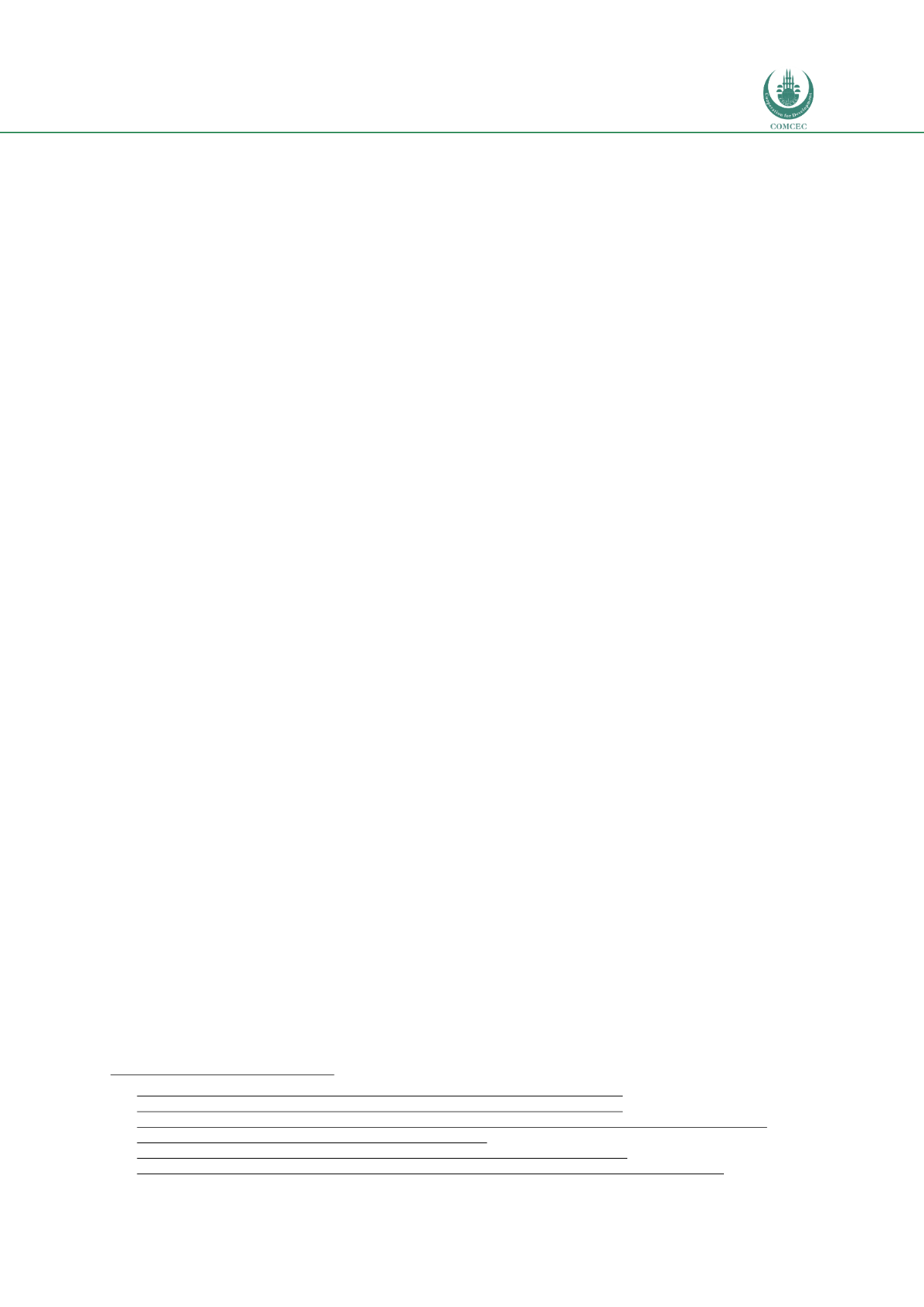

Governance of Transport Corridors in OIC Member States:
Challenges, Cases and Policy Lessons
175
there is a lack of specific governmental information on the day to day handling of the corridors. Even
so, there is something to tell about Indonesia’s stance on transport corridors and international trade.
We have already established in the chapter on ASEAN that the transport corridors are not always
incorporated in national strategies and plans, and that although ASEAN strives for mutual recognition
of each other’s inspections, certificates, etc., the respective countries still have a long way to go with
regards to implementation and enforcement. The current President of Indonesia, Joko ‘Jokowi’
Widodo, is interested more in bilateral than in multilateral cooperation. Although he sees the need for
ASEAN cooperation, he seems more interested in what ASEAN does for his country than in the inherent
value of “liberal internationalism”. The focus for Indonesia has shiftedmore towards national interests.
Even so, Jokowi, as “default leader” of ASEAN, is pushing to “strengthen economic cooperation” in the
region and is “pushing ASEAN to be more effective and cooperative.”
102
The main focus of Jokowi’s
foreign policy is the strengthening of Indonesia as a maritime power, especially the modernization of
its ports and the upgrading of its navy (Heiduk, 2016).
Corridor Objectives and Political Support
Since the beginning of Jokowi’s reign there has been doubt about his stance on regional cooperation,
and ASEAN specifically (Heiduk, 2016). It was felt that ASEAN was no longer a priority for Indonesia:
“Jokowi lacks former President Yudhoyono’s enthusiasm for multilateral diplomacy through regional
and international organisations in general”. Since 2017 however, there has been a visible move
towards strengthening regional ties and continuing cooperation in the region. In early 2017, at the 30
th
ASEAN Summit, Jokowi had the following to say: “Do not let ASEAN become a proxy for the rivalry of
big powers. ASEAN must remain a hub of regional diplomacy. Unity and centrality are the keys to
making ASEAN a respected organisation.”
103
Indonesia’s ‘Master Plan Acceleration and Expansion of Indonesia Economic Development’, or “MP3EI”
was presented under President Yudhoyono’s administration in 2011. The name “MP3EI” is no longer
in use. The vision explained in this plan is still shared by the new administration, though it has been
criticized for lacking “concrete measures to achieve the (abstract) targets that are set out in the
program”.
104
From this plan: “growth centres and connectivity are the building blocks of Indonesia
Economic Corridors. Increasing the economic potential of the region through the economic corridors
has become one of the three main pillars of MP3EI
.”
[…] “Indonesia’s national connectivity is part of
the global connectivity. Therefore, the strengthening of the national connectivity has to consider
Indonesia connectivity with regional and global economic growth centres in order to enhance national
competiveness and optimize advantages of Indonesia’s regional and global connectivity” (MfEA, 2011).
Institutional Framework
We did not gather much information on the institutional framework within Indonesia.
As a member of ASEAN, it can be presumed that the ministry of Transport is involved, as the general
direction of ASEAN is set by its member’s transport Ministers.
105
The ASEAN Master Plan overall
coordination is in the hands of The ASEAN Connectivity Coordinating Committee. They will do this
together with “National Coordinators who should be appointed by the Governments of respective
ASEAN Member States, with the support of a dedicated unit with adequate funding in the ASEAN
Secretariat.” (ASEAN, 2011). 2008 saw the establishment of the National Logistics Team, a cross-
departmental team under the Coordinating Minister for Economic Affairs. In 2007 Indonesia started a
pilot project for a National Single Window System, which has “since gradually expanded its coverage
to more government agencies and ports.”.
106
102
http://www.internationalaffairs.org.au/australianoutlook/asean-indonesia-under-jokowi/.103
http://www.internationalaffairs.org.au/australianoutlook/asean-indonesia-under-jokowi/.104
https://www.indonesia-investments.com/projects/government-development-plans/masterplan-for-acceleration-and-expansion-of-indonesias-economic-development-mp3ei/item306.
105
http://asean.org/storage/2012/05/List-of-ASEAN-Directors-General-Jan-2017-for-CRD.pdf.106
http://siteresources.worldbank.org/INTTLF/Resources/515003-1276029788910/LPI_Booklet_Indonesia.pdf.















